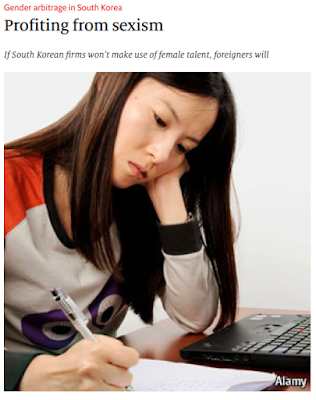Edward Millner's blog. It contains links to articles for students taking Principles of Microeconomics and Managerial Economics. It also contains links to articles about politics. The opinions here are mine. No one at VCU reviews or approves what I post.
Wednesday, October 30, 2019
Evidence that Gary Becker is correct that minimum wage reduces the cost of discrimination
This post reports a study that finds US firms are hiring women at lower wages than equally qualified (or even less qualified) men. Hiring women gives the US firms a cost advantage. As other firms mimic the US firms to keep up, the increase in demand for women and the decrease in demand for men will reduce the disparity in wages.
If minimum wage forced the US firms to pay the same wages to men as women, the US firm would not have an incentive to hire women over men and could not set in motion changes in demand that => less disparity in wages.
Monday, October 21, 2019
A $0.01 per ounce increase in tax on soft drinks => 12.2% decrease in quantity purchased
This paper estimates the impact of taxes of soft drinks on consumption. Some money quotes follow.
- "We find that an increase in the beverage tax rate of 1 cent per ounce decreases household purchases of taxed beverages by 53.0 ounces per month or 12.2 percent."
- "we find that the decline was concentrated in Philadelphia, where the tax decreased purchases by 27.7 percent. We do not find impacts of the taxes in the other three cities combined."
Here are two questions.
- What is the price elasticity of demand implied by the first quote if the average price of soda is $0.10 per ounce? Price of one ounce = $0.10 => price of a 16-ounce drink = $1.60.
- Does the inability to find impacts of the taxes in the other three cities combined mean that the consumers in the other three cities disobey the law of demand?
Friday, October 11, 2019
Pending Brexit affects the present
The WSJ reports that the rush to export crops from UK before a no-deal Brexit => lower prices of crops and higher prices for shipping. Can you use supply and demand to illustrate what is happening?
Who loses when China exports more to the US?
This paper examines the impact on prices in the US when China sells more here. Money quotes:
- "This paper fi nds that U.S. consumer prices fell substantially due to increased trade with China."
- "The estimates imply that trade with China increased U.S. consumer surplus by about $400,000 per displaced job, and that product categories catering to low-income consumers experienced larger price declines."
Wednesday, October 9, 2019
Ghana and Ivory Coast hatch a plan to help cocoa farmers
The WSJ (Oct.2019) describes that a plan to tax cocoa exports from Ghana and Ivory Coast is causing turmoil in the futures market for cocoa. The plan is to use the tax to provide aid for cocoa farmers.
Here is the comment I posted.
Tax on cocoa sold from Ghana and Ivory Coast => decrease in supply, of cocoa from Ghana and Ivory Coast, increase in price paid by buyers, decrease in price excluding tax received by sellers, and $400 more for government. If the government transfers the $400 to farmers, their average revenue would increase.
High price paid by buyers for cocoa from Ghana and Ivory Coast => increase demand for cocoa grown elsewhere and higher prices and quantities sold for sellers in other countries. In long run, the sellers in other countries would grow more and drive price for everyone down, perhaps back to the original level.
Tuesday, October 8, 2019
CA passes a statewide law to control rent
The WSJ (Oct. 2019) reports on the bill passed in CA to control rent. Here are two money quotes.
- "The governor has said the rent caps and tenant protections are necessary to help people being squeezed out of their homes. The law limits annual rent increases at 5%, plus the rate of inflation, and adds some barriers for landlords seeking to evict people."
- "'Rent caps don’t solve the housing crisis,’ said Matthew Lewis, a spokesman for California YIMBY, which advocates for more housing and co-wrote high-profile statewide rezoning legislation known as Senate Bill 50 that was back-burnered until next year. 'The root of the problem is a shortage of housing, and it is a severe, long-term shortage.'”
Questions:
- Who gains and who loses?
- Do rent controls increase the quantity of housing?
- Do rent controls create or reduce shortages of housing?
Monday, October 7, 2019
A great example of using the power of the government to erect barriers to entry
Why would Kentucky have a law that lets incumbent firms stifle entry into the ambulance industry? One answer: to help the incumbents earn profit in the long run.
Wednesday, October 2, 2019
Subscribe to:
Comments (Atom)






